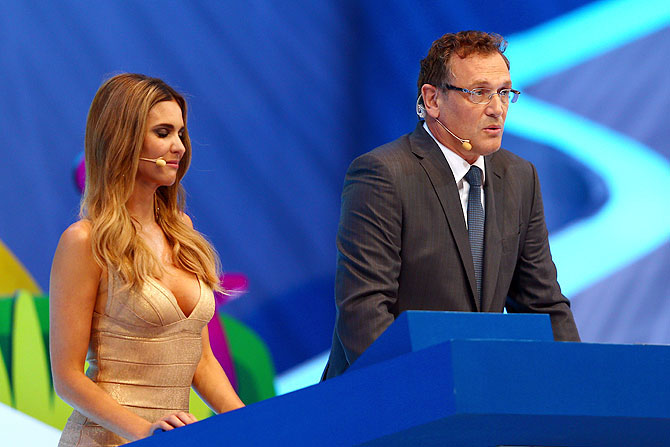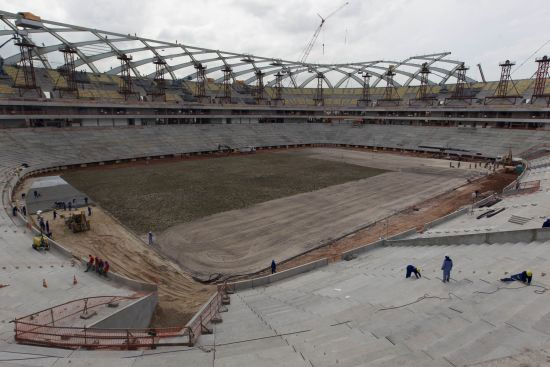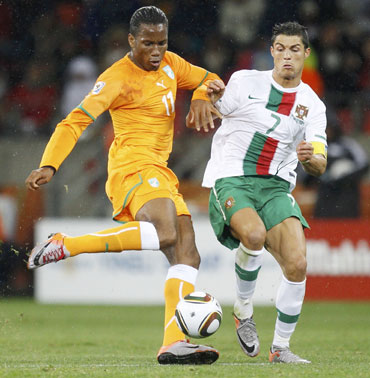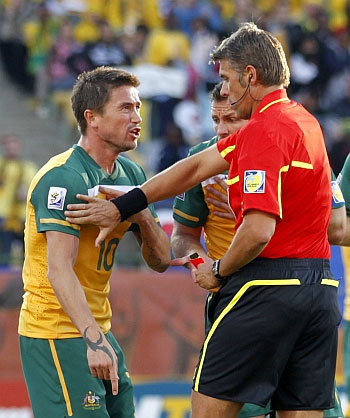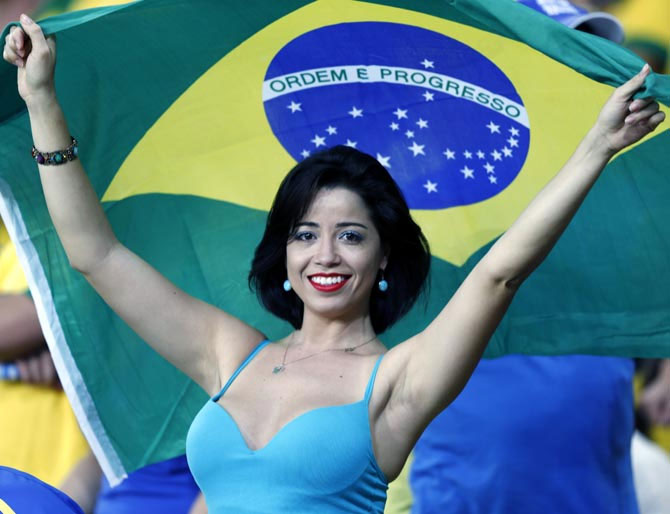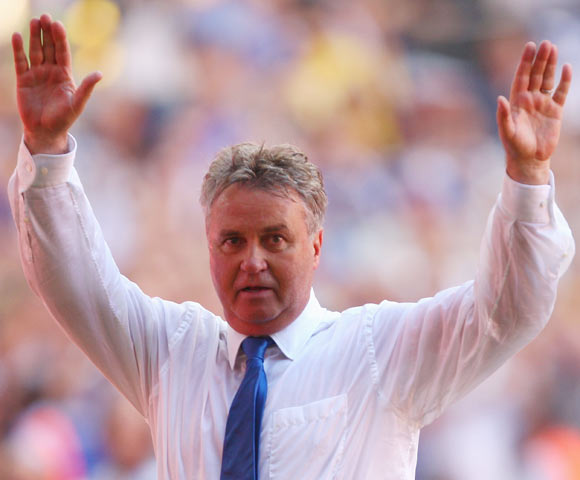 | « Back to article | Print this article |
World Cup chit-chat: 'Brazil stadium problems warning for Russia, Qatar'
With the FIFA World Cup 2014 just over two months away, Rediff.com brings you all the talk surrounding the tournament that will be played in Rio, Brazil...
The serial delays in building Brazil's 12 World Cup stadiums should serve as a lesson to Russia and Qatar, the countries hosting the 2018 and 2022 tournaments, FIFA secretary general Jerome Valcke said on Thursday.
"We are late, we face difficulties and risks right up to the last minute because we haven't tested the installations, we need time to test them," Valcke told reporters in Rio after meeting with members of the Brazilian government and Local Organising Committee.
"It's a lesson and definitely we will act differently and we will have to find a different way of working in Russia in 2018," Valcke said.
Brazil will host the World Cup in June and July but it faces a mad rush to get everything ready in time.
Three of the 12 stadiums are still not complete, including the Arena Corinthians in Sao Paulo that is due to host the opening match between Brazil and Croatia on June 12.
That arena and some others have yet to install the telecoms networks that will be used for broadcasters and media.
Originally, organisers said those networks had to be in place 90 days before the competition began in order to properly test them but with 77 days to go before the first ball is kicked work has not yet started.
"This is the last big challenge for the World Cup," Deputy Sports Minister Luis Fernandes told Reuters.
"After that the challenges are operational, in other words, holding the test events to see if we can make things better."
Three stadiums were supposed to be ready in December but they are still not complete
FIFA now says important test events will take place in Cuiaba on April 26, in Curitiba in mid May, and on May 17 in Sao Paulo. Those three stadiums were supposed to be ready in December but they are still not complete. Twelve stadiums will be used in all.
One other issue is the lack of progress on the temporary installations such as hospitality tents and storage containers that will be brought in to help with the energy, security and sponsors areas outside the stadiums.
Valcke said last week Sao Paulo had resolved the issue but on Thursday back-tracked and said he expected a resolution this Friday.
Porto Alegre city council voted on Tuesday to award tax breaks to companies who invest in the installations, paving the way for work to begin. Valcke said he hoped the first containers would be in place outside the Beira Rio stadium by April 15.
Valcke, who caused a diplomatic incident two years ago when he said Brazil needed a "kick up the backside" to speed up their work, complained of the reaction when he criticised the home nation's preparations.
"Every time I said something a bit hard you the media said I am the worst person in world," he said.
Valcke said FIFA would learn from its mistakes and do things differently in Russia and particularly Qatar, which will have fewer stadiums.
World Cup referees to protect players against bad tackles
Protecting players from heavy tackles will be the priority for referees at this year's World Cup in Brazil rather than other contentious issues such as diving, handball and the triple punishment.
Football is generally considered to have become much less violent on the pitch in the last few years and the game's governing body FIFA said during a training week for World Cup referees on Thursday that it wanted to keep it that way.
"There are always things we are asked to be vigilant on, pretty much always trying to protect the players, from heavy play, from foul play and violent play and also protecting the image of the game," 2010 World Cup final referee Howard Webb told reporters.
FIFA's head of refereeing Massimo Busacca said referees attending the World Cup, which starts on June 12, would be instructed to nip any signs of rough play in the bud.
"The safety of the players is very important so the referees have to read the situation carefully at the beginning of the game," he said.
"If players start committing this type of (violent) foul, we have to take action to avoid it. We have to say: 'We do not want to see this kind of football in this competition'.
"This is the role of the referee, to try to understand and anticipate. Sometimes, the players forget because of the adrenalin. The role of the referee is to say: 'Do you want to play today or do you want to take a shower?'
"We must try to avoid these situations which can destroy football."
Although diving is considered by many observers to be the scourge of the sport, Englishman Webb said it was a relatively small headache for match officials.
"It's one of the things we are always asked to be vigilant about because when it's not accurately identified it can have quite a damaging effect on the game," he said.
'Clear message is being sent'
"The message is being sent, loud and clear, to the competing teams about their responsibilities as well.
"If you look at the number of decisions made around simulation, they are quite low compared to the vast number of decisions we have to make," he added.
"Although it's a small problem, it has a big impact when it does happen, so of course it becomes quite serious."
Webb said the pace of the modern game made it almost unrecognisable from when he started 20 years ago and said the relationship between match officials and players was good.
"It's almost a different sport form many years ago, so we have to adapt to that and be as quick as the players are in terms of the speed of their thought and speed of their play," he said.
"In most cases, the experience I have with the players is positive, and that includes the famous players and the young players.
"You are certainly aware of the increased scrutiny to when I started 20 years ago.
"The attention on football increases all the time. It's so important to so many people in so many ways and we feel that.
"We are aware of our responsibility and aware that if we do make a mistake, there will be a big reaction.
"We care about what we do for sure, it's not so easy for us either when we make a mistake.
"The flip side is when we do a good job, and many games do go fantastically well for all of us, then it's a fantastic high and a great thing to be involved in."
Fans could miss World Cup games due to air travel issues
Latin America's biggest airlines warned of flight delays and diversions during the soccer World Cup in Brazil as travellers pour into the country's already overcrowded airports, causing some fans to be late for matches or even miss them.
"The problem is going to be that you're not going to have a place to land the plane, so you're going to spend three hours flying in circles," said Brazilian German Efromovich, who controls Colombian airline Avianca, at an air show in Santiago on Thursday.
"And then you fly to another city 300 kilometers away and put the passengers on a bus and they arrive to the game after it's over."
"Then let's see what happens," Efromovich said.
The carriers are concerned that fans will blame them for any logistical problems that cause them to miss games they have paid out hundreds of dollars to attend in the event which kicks off June 12.
"I don't know who's going to win the games, but the airlines are going to lose with the World Cup," said Enrique Cueto, chief executive of the region's largest carrier, LATAM Airlines.
"If you do things right with operations you can wind up with a draw," he said. "You get it wrong and you don't get to a game on time and you'll soon see what you get."
Airlines have already flagged concerns about potential fines from the Brazilian government over delayed flights and lost bags.
Many of Brazil's biggest airports are running beyond capacity after years of neglect by state operator Infraero.
With the clock ticking down before kickoff in 2-1/2 months, Brazil's busiest airport in Sao Paulo is still racing to finish a new terminal and other airports are preparing temporary tents to receive the influx of passengers.
"I think it's going to cost the industry, but it's OK, it's going to be a wonderful spectacle," said Cueto.
Dutch confirm Hiddink appointment, Blind follows in 2016
The Netherlands named two new national coaches on Friday with Guus Hiddink's appointment after the World Cup confirmed following months of speculation and Danny Blind lined up to replace him after the Euro 2016 tournament.
Hiddink had been the front-runner for several months to take over from Louis van Gaal after the World Cup in Brazil and told reporters details of his two-year contract long before the Dutch football association's (KNVB) formal announcement on Friday.
However, the KNVB did surprise many by also naming Blind as Hiddink's successor after Euro 2016 in France, handing the former international defender an extra two-year contract till the 2018 World Cup.
Blind, who is an assistant coach at Ajax Amsterdam, and former striker Ruud van Nistelrooy, who recently joined the staff of PSV Eindhoven, will serve as Hiddink's assistants.

© Copyright 2025 Reuters Limited. All rights reserved. Republication or redistribution of Reuters content, including by framing or similar means, is expressly prohibited without the prior written consent of Reuters. Reuters shall not be liable for any errors or delays in the content, or for any actions taken in reliance thereon.
